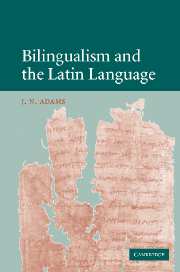Book contents
- Frontmatter
- Contents
- Preface
- Acknowledgments
- List of abbreviations
- 1 INTRODUCTION
- 2 LANGUAGES IN CONTACT WITH LATIN
- 3 CODE-SWITCHING
- 4 BILINGUALISM, LINGUISTIC DIVERSITY AND LANGUAGE CHANGE
- 5 LATIN IN EGYPT
- 6 BILINGUALISM AT DELOS
- 7 BILINGUALISM AT LA GRAUFESENQUE
- 8 THE LATIN OF A LEARNER (P. AMH. II.26): A CASE STUDY
- 9 SOME CONCLUDING REMARKS
- Bibliography
- Indexes
1 - INTRODUCTION
Published online by Cambridge University Press: 03 December 2009
- Frontmatter
- Contents
- Preface
- Acknowledgments
- List of abbreviations
- 1 INTRODUCTION
- 2 LANGUAGES IN CONTACT WITH LATIN
- 3 CODE-SWITCHING
- 4 BILINGUALISM, LINGUISTIC DIVERSITY AND LANGUAGE CHANGE
- 5 LATIN IN EGYPT
- 6 BILINGUALISM AT DELOS
- 7 BILINGUALISM AT LA GRAUFESENQUE
- 8 THE LATIN OF A LEARNER (P. AMH. II.26): A CASE STUDY
- 9 SOME CONCLUDING REMARKS
- Bibliography
- Indexes
Summary
INTRODUCTORY REMARKS; SOME ISSUES IN THE STUDY OF BILINGUALISM
It is thought that bilingualism is more common than monolingualism, and yet linguistics has traditionally operated as if the monolingual were the normal speaker. Bilingualism across the Roman world cannot be quantified, but numerous languages survive in the written record (usually in a fragmentary state) or are attested in contact with Latin (Gaulish, forms of Hispanic, Oscan, Umbrian, Venetic, Etruscan, Hebrew, Aramaic, Egyptian Demotic and hieroglyphics, Coptic, Punic, Libyan (?), Thracian, forms of Germanic, as well as Greek), and others were spoken without leaving any trace in our sources. In the vast expanses of the Roman Empire, where mobility was high among such groups as the army, administrative personnel, traders and slaves, language contact was a fact of everyday life. To survey bilingualism in the whole of the ancient world would be an immense task, but the Roman domain, particularly during the Empire, offers more manageable data.
Bilingualism has traditionally been of interest not only to linguists, but also to anthropologists, social and cultural historians and students of literature. As found in the Roman period it has received a good deal of attention, explicitly in some of the works of (e.g.) Dubuisson, Holford-Strevens, Horsfall, Leiwo, Millar, Neumann and Untermann, Rochette and Wenskus, and implicitly in virtually any work on Latin literary genres with Greek forerunners.
- Type
- Chapter
- Information
- Bilingualism and the Latin Language , pp. 1 - 110Publisher: Cambridge University PressPrint publication year: 2003
- 1
- Cited by



